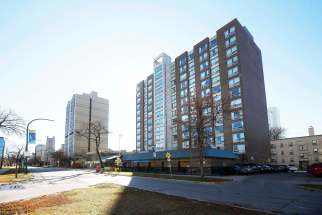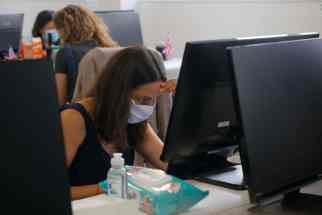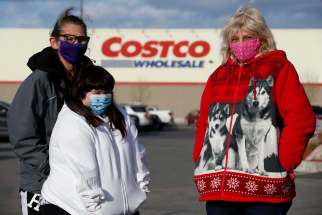Spread the message, not COVID: Stay home when sick
Read this article for free:
or
Already have an account? Log in here »
To continue reading, please subscribe:
Monthly Digital Subscription
$0 for the first 4 weeks*
- Enjoy unlimited reading on winnipegfreepress.com
- Read the E-Edition, our digital replica newspaper
- Access News Break, our award-winning app
- Play interactive puzzles
*No charge for 4 weeks then price increases to the regular rate of $19.00 plus GST every four weeks. Offer available to new and qualified returning subscribers only. Cancel any time.
Monthly Digital Subscription
$4.75/week*
- Enjoy unlimited reading on winnipegfreepress.com
- Read the E-Edition, our digital replica newspaper
- Access News Break, our award-winning app
- Play interactive puzzles
*Billed as $19 plus GST every four weeks. Cancel any time.
To continue reading, please subscribe:
Add Free Press access to your Brandon Sun subscription for only an additional
$1 for the first 4 weeks*
*Your next subscription payment will increase by $1.00 and you will be charged $16.99 plus GST for four weeks. After four weeks, your payment will increase to $23.99 plus GST every four weeks.
Read unlimited articles for free today:
or
Already have an account? Log in here »
Hey there, time traveller!
This article was published 15/10/2020 (1883 days ago), so information in it may no longer be current.
Staying home when sick may be the single most important thing people can do to slow the spread of COVID-19. But in a culture where biting the bullet and going to work or school with a sore throat, a runny nose or a cough – if not a full-blown fever – has been programmed into us since elementary school, it’s not a natural directive to follow.
“I’ve done it,” Dr. Brent Roussin, the chief provincial health officer, confessed Thursday, explaining how many of us have ventured out in public when sick prior to the pandemic — and how that needs to change.
It’s not clear how many of the 3,098 cases of COVID-19 in Manitoba were the result of someone spreading the virus in the community while symptomatic. But to illustrate how damaging it can be, Roussin shared the example of someone with symptoms who attended a social gathering Sept. 11, which led to 40 infections in just under two weeks. That represented 2.3 per cent of the 1,711 total infections in Manitoba at the time.
Roussin said contact tracing has revealed multiple examples of people going to work or attending social gatherings while symptomatic. While it’s not easy for some to stay home from work while ill (including those without financial supports, such as paid sick leave), there’s no excuse for those attending social gatherings. It’s reckless.
It’s unclear what it would take for people to heed the warnings. But it is something the province has to ramp up in its messaging. Thursday’s example of the 40 infections was a good start.
If one symptomatic person attending a social gathering can result in 243 close contacts and 40 infections over 12 days, “multiple” known cases of people going out in public while sick may have resulted in hundreds of infections. Of the 2,166 cases of COVID-19 identified in Manitoba as of Oct. 3, 128 required hospitalization (including 37 intensive care unit admissions), according to the province’s latest weekly surveillance report. That means about six per cent of those infected in Manitoba require hospitalization, mostly the elderly and those with underlying health conditions. If symptomatic people who refuse to self-isolate have resulted in hundreds of infections, they may have been responsible for putting dozens of people in the hospital. It’s something to think about if you have a sore throat or a cough and feel the need to head out to the local bar, or a private party.
Staying home when sick has been a message Roussin and others have been driving home since the beginning of the pandemic. They’ve practically begged people not to go out in public when symptomatic. Despite that, the evidence shows many continue to ignore those directives.
It’s unclear what it would take for people to heed the warnings. But it is something the province has to ramp up in its messaging. Thursday’s example of the 40 infections was a good start.
Governments also have to do a better job of providing supports to those who can’t easily stay home from work. There has been talk of rolling out new provincial aid for people who don’t have the means to call in sick. But it still hasn’t materialized.
Governments also have to do a better job of providing supports to those who can’t easily stay home from work. There has been talk of rolling out new provincial aid for people who don’t have the means to call in sick. But it still hasn’t materialized. It’s all well and good to insist people shouldn’t go to work while symptomatic. But if doing so means they can’t pay their rent or Hydro bill, government can’t expect much in the way of compliance.
It’s entirely possible Manitoba’s COVID-19 case load could have been a third smaller, or less, if symptomatic people followed public health guidelines and stayed home when sick. That would have meant fewer severe outcomes (including deaths), less pressure on the public health system and a smaller number of hospitalizations. Winnipeg may have avoided the surge in cases it’s now seeing, as well as new restrictions on bars, restaurants and others expected to be announced Friday (measures that will cause even greater economic hardship to small business and employees).
Government alone can’t solve the problem of symptomatic people refusing to self-isolate. It’s up to individuals and families to talk to each other, provide support — and admonition when necessary — when someone in their circle thinks it’s acceptable to venture out in public when sick.
It’s a simple message: when you’re sick, stay home. You just may save a life.
tom.brodbeck@freepress.mb.ca

Tom has been covering Manitoba politics since the early 1990s and joined the Winnipeg Free Press news team in 2019.
Our newsroom depends on a growing audience of readers to power our journalism. If you are not a paid reader, please consider becoming a subscriber.
Our newsroom depends on its audience of readers to power our journalism. Thank you for your support.







